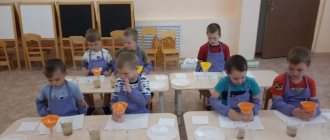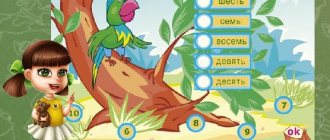Formation of relationships among preschool children in play activities
The heyday of role-playing games begins at the age of four,
20
it reaches its highest development in the middle of preschool age (5-6 years), and then is gradually replaced by games with rules that arise after 7 years. The creative role-playing game of a preschooler undergoes significant changes both in theme, the nature of game actions, duration, and in the strength of the educational impact. The plot of the game develops gradually. At the very beginning, the game is a simple action with one object. This action is repeated many times. The next stage in the development of the plot is represented by games consisting of a number of elementary actions that are not yet connected with each other. Further development of the plot is that the children move on to a game consisting of two or three interconnected actions. This transition from objective actions to playful ones occurs at the end of the third - beginning of the fourth year of life. This period of gaming activity is characterized by significant qualitative changes: role-playing games begin to develop. The development of role-playing play occurs in close dependence on the child’s process of mastering objective actions and mastering speech. The teacher’s task is to organize children’s lives in such a way, to apply educational techniques that will contribute to the complexity and enrichment of children’s “display” games and the timely formation of positive personality traits. In the junior group, everyday games are played (“family”, “kindergarten”), in the middle group there are games that reflect the professional work of adults (driver, driver, salesman, doctor, teacher, police officer, music teacher), and in the senior and preparatory school In groups, games related to social themes predominate (“factory”, “trip to the collective farm”, “flight into space”, “school”, “library”, “travel”).
Thus, the meaning of the play of children of different groups changes: for the younger ones it is in the actions of the person whose role the child plays, for the middle -
21
in the relationship of this person to other people, for elders - in a reflection of the typical relationships of adults. So, if in the younger group in everyday games the life of a family or kindergarten is reflected episodically, the actions are inconsistent and monotonous, then in the middle group the integrity of the plot, interconnectedness is already noted, the duration of the game increases. Children begin to play situationally, without any preliminary plan, although some researchers report this already in children of the fourth year of life. Older children discuss the concept of the game, select, and sometimes independently prepare material for the games. Games become lengthy, sometimes children play a week, two, a month in one game, constantly complicating and supplementing the plot of the game with new episodes, fragments, roles. Advance collective planning of the game is observed: choosing a topic, distributing roles, developing and discussing the rules of the game, making attributes. This feature allows the teacher to direct the course of the game, develop it, subordinating the game activity to the purposeful formation of the necessary qualities of the team as a whole or of an individual child. In the creative role-playing game of older preschoolers, the rules of which are drawn up by the children themselves, self-control and self-esteem are developed. Already in children of primary preschool age, cognitive interests in the phenomena of life around them are intensively developing, as well as interest in the personality of a peer and joint activities with him. The level of development of children's play interests is to some extent determined by the level of development of interpersonal relationships and, conversely, the development of play interests depends on the nature and level of communication of the children in the group. It is children with more developed interests who are the constant organizers of joint games. Interactions between children are characterized primarily by the basis on which the unification between them occurs: will there be
GAME AS A MEANS FOR FORMING RELATIONSHIPS WITH PEERS IN PRESCHOOL AGE
Ya.O.Ten
Scientific supervisor: teacher S.E. Surovitskaya
The game is vital
childhood laboratory.
S.T.Shatsky
Modern children live in an era full of contradictions, saturated with information, constant changes, and the transience of events. Live communication with adults or other children is gradually being replaced for them by watching television programs, films, and computer games. The child’s behavior often mirrors what he sees on the screen. At the same time, he does not have enough reserves of physical and mental health to cope with such stress. Children become impulsive, it is difficult for them to control their emotions, understand their own experiences and the feelings of other people.
In preschool age, the child’s world, as a rule, is inextricably linked with other children. And the older a child gets, the more important contacts with peers become for him.
Considering that the leading activity of preschoolers is play, there is no doubt about its effectiveness in forming friendly relationships between the child and his peers. It is in play that a child’s personality is revealed more spontaneously due to the fact that tension is relieved during play activities, children behave more easily and relaxed.
Purpose
The work is the selection and testing of a set of games for the formation of friendly relationships among children of senior preschool age.
To achieve this goal, it is necessary to solve a number of the following tasks
:
1. To study the theoretical aspects of the formation of positive relationships in preschool children in play activities.
2. Analyze the relationships between children of senior preschool age and their peers during the operation of a preschool institution.
3. To study the effectiveness of a selected set of games that ensures the formation of friendly relationships in a group of older preschoolers.
Object of study
is the process of forming friendly relationships with peers in older preschool age.
Subject of study
– a set of games that ensure the formation of friendly relationships among children of senior preschool age.
Research methods:
study and analysis of theoretical literature, advanced pedagogical experience on this issue; observation as a method of collecting information, the “Secret” technique, formative experiment, analysis of the results obtained.
Research hypothesis:
For the successful formation of friendly relationships among children of senior preschool age, it is necessary to carry out a set of games and exercises, the implementation of which will lead to a qualitative change in relationships in the peer group of senior preschool age.
Having examined in detail all aspects of the theoretical foundations of the formation of relationships among preschool children in play activities, we moved on to experimental research.
The research was carried out at the preschool educational institution “Nursery-Garden No. 13 in Rogachev” with children of the older group, 12 children took part.
The research methodology is stage-by-stage and contains 3 experiments: ascertaining, formative and control.
At the ascertaining stage, we identified the level of development of friendships among older preschoolers. For this purpose, we carried out the diagnostic technique “Secret” by T.A. Repina.
Using this technique, we identified the position (sociometric status) of the child in the preschool group, his attitude towards children, as well as his idea of the attitude of his peers towards him; the degree of children’s goodwill towards each other, their emotional well-being. Before the start of the experiment, 3 pictures were selected for each child using the “Secret” method. Then each child was given instructions: “Today the children of our group will play an interesting game. In secret, so that no one knows, everyone will give each other beautiful pictures.” Next, the child was given 3 pictures and asked to give them to the children he wanted, just one for each. If there was any difficulty, we helped by repeating the instruction “you can give it to those children with whom you like to play.” At the same time, the child was asked the question: Why did you decide to give it to these particular children?
The results obtained were entered into the diagram “Level of relationships among children in the senior group,” and the number of general and mutual elections was calculated; the number of children who fell into the groups of “leaders”, “preferred”, “neglected”, “rejected”.
At the formative stage, we developed a set of games and exercises aimed at developing friendly relationships with peers in children of senior preschool age.
The complex of games consists of three parts: preparatory, main and final.
In the preparatory part, simple ritual exercises were used that helped the children get ready to work in a group and establish contact. (Exercise “Smile”), games aimed at creating an emotionally positive mood in the group (“Say kind words to Mishka”, “Call your neighbor affectionately by name”).
In the main part, children played games in which preschoolers learned to feel and experience, establish friendly contacts, communicate using gestures, facial expressions and pantomimes: “Good Elves”, “Ants”, “Find a Friend”, “Who Called”, “Guess to the touch".
All these games were played in the morning, between classes and in free time with all the children in order to find out in what mood the children came to the preschool, to promote good relationships with peers, and to create a cheerful mood for the whole day. We tried to involve all children, but we always included children who have problems in relationships with peers.
When conducting games and exercises, we used the following techniques: encouragement, positive evaluation, praise, explanations, directions, reading fiction.
In the final part, together with the guys, we discussed some techniques and rules, which were formalized in the “Rules of Friendship”, helping to ensure that the guys’ communication proceeds without quarrels and conflicts:
Help a friend, if you know how to do something, teach him too.
If a friend is in trouble, help him as much as you can.
Share with a friend, play in such a way that you want to give the best to your friend.
Stop your friend if he is doing something bad.
Know how to rejoice in your friend’s successes.
Know how to calmly accept help and advice from other guys.
At the control stage, to determine the level of friendly relationships in the senior group after purposefully carried out work, we repeated T.A. Repina’s “Secret” method.
A comparison of the results obtained at the ascertaining and control stages shows that the set of games and exercises aimed at developing friendly relationships with peers in older preschool children was selected correctly and there were no rejected children in the group. This is clearly visible in the comparative table of the ascertaining and control stages.
Level of relationships in the senior group at the ascertaining and control stages
| Stages | "Leaders" | "Preferred" | "Neglected" | "Les Miserables" |
| Ascertaining | 17% | 58% | 17% | 8% |
| Control | 25% | 50% | 25% | 0% |
Thus, after the work, the level of development of friendships among older preschoolers has changed, and there are no rejected children in the group. The hypothesis that for the successful formation of friendly relationships among children of senior preschool age, it is necessary to carry out a set of games and exercises, the implementation of which will lead to a qualitative change in relationships in the peer group of senior preschool age, was confirmed.
Relationships between children during games
Share this article:
Children's relationships during games often project the behavioral realities of adults onto themselves. The child acts as a kind of indicator of the older generation. Such manifestations are especially pronounced during play incidents with daughters and mothers, as well as when taking on professional and official powers. Game processes have a beneficial effect on the course of team-friendly relations.
Even at a tender preschool age, various inclinations begin to appear. Such as leadership and organizational skills. From the games it will become clear what temperamental and natural preferences are. It’s easy to detect over-zealousness or over-activity. To find out what qualities are inherent in a child, you just need to take a closer look at the game’s favorites.
It is worth considering that it is typical for infants and children under three years of age not to give away their toys, and also not to get along with other children. It is also necessary to realize that in a large family, socialization occurs faster. An only child can have a more difficult and difficult time getting used to society.




